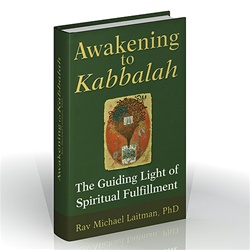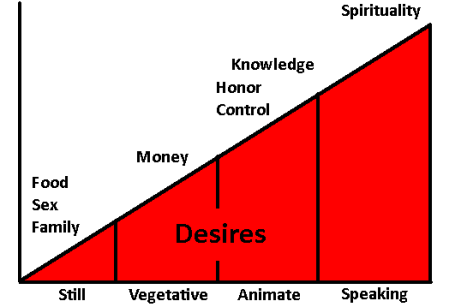How the Desire for Spirituality Begins with an Enormous Unclarified Desire
As soon as a spark of spirituality appears in you, even as an impulse that is still hidden from your eyes, you stop being satisfied with your life. You begin to search for something beyond money, honor, sex, food, power, and knowledge and don’t know where to find what you really want. This is the first time you feel that there is something beyond your surroundings in this world. That spark evolves later on to become the desire for contact and adhesion with the Creator.
All throughout this journey, a person is defined by his or her unique desire to cleave to the Creator, differentiating humanity from other life forms. People still have within them the desires of the still, vegetative, and animate degrees, but our specific degree is measured by the intensity of our desire for the Creator.
The Need for Spirituality Is the Final Level of Human Desire to Develop
In his introduction to the book Panim Meirot Umasbirot (Illuminating and Welcoming Face), Baal HaSulam writes that all the desires except the one called “human” are measured by the desired object:
- In the still degree, desires are turned toward food, sex, and family, meaning bodily and beastly pleasures.
- In the vegetative degree, desires are turned toward money and security.
- In the animate degree, desires are turned toward power, control, and respect.
- In the speaking degree, desires are turned toward spirituality. A person’s desires have by now evolved to such an extent that he or she desires something outside the physical world.
According to the Attributes of Spirituality, Are You a Human or a Beast?
Everyone has some attributes that they want to keep as they are, and ones that they want to change for spirituality. To the extent that one is willing to give up one’s inner attributes for the purpose of attaining spirituality, one is called “human,” and to the extent that one is unable to give up certain attributes, one is called “beast.”
The beastly degree is one where a person does not want to change, meaning refuses to change inner traits. For example, a person may think that, for the time being, he or she is unable to get rid of certain inner traits, even for the spiritual goal. Until that person is able to give up something, he or she is called a “beast.” That, in fact, is the contradiction between the general populace and the Kabbalist. This distinction represents the greatest distinction of all—the difference between ourselves and the Creator. The general populace advances according to its nature, whereas the unique individual, the Kabbalist, who yearns for connection with the Creator, advances according to the attributes of the Creator, which already exist within him or her.
Kabbalah Is a Method for Individuals to Attain Spirituality
The main difference between the Kabbalists and other people is in the education they do or do not receive. For the general society it is best to stay conservative, in a still degree, unchanging. Everything that is taught in society should be kept without change. That way, people keep themselves safe from confusion and assimilation. However, for the individual, the more different and disobedient his or her personality is to others, guided only by the feelings in his or her heart, the nobler it is. Therefore, the situations faced by the unique individual should not be mixed with those of the ordinary person, who is one of many. One who feels a desire for the Creator must develop his or her uniqueness through the study of the Kabbalah.
 “Do You Want True Spiritual Attainment? Click Here” is based on the book, Awakening to Kabbalah: The Guiding Light of Spiritual Fulfillment by Dr. Michael Laitman.
“Do You Want True Spiritual Attainment? Click Here” is based on the book, Awakening to Kabbalah: The Guiding Light of Spiritual Fulfillment by Dr. Michael Laitman.
![]() Start Your Kabbalah Studies Here: Take a Free Kabbalah Course »
Start Your Kabbalah Studies Here: Take a Free Kabbalah Course »

